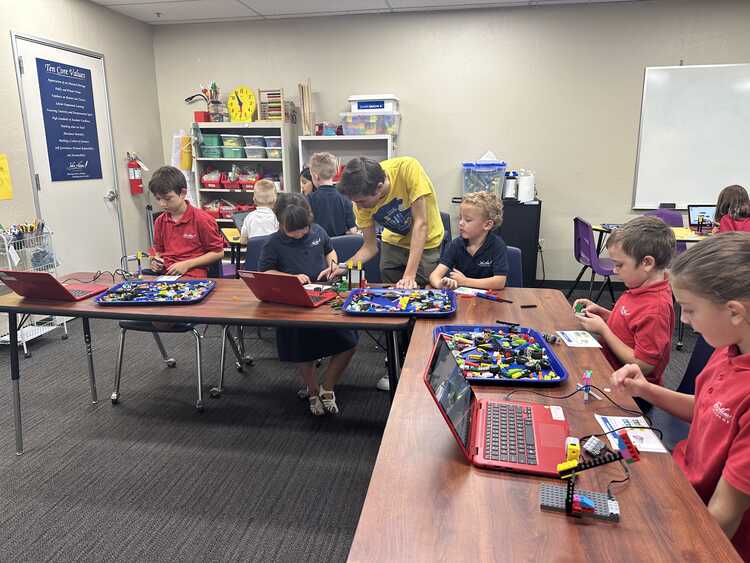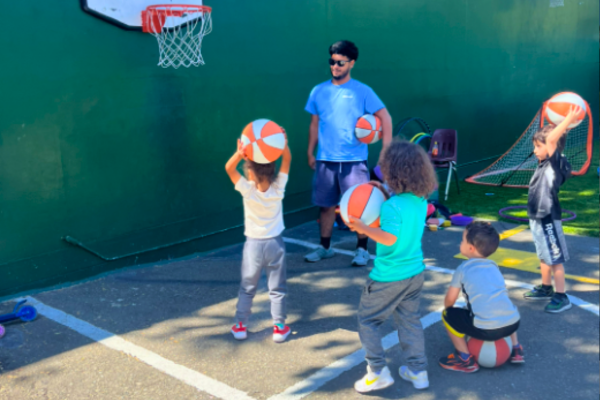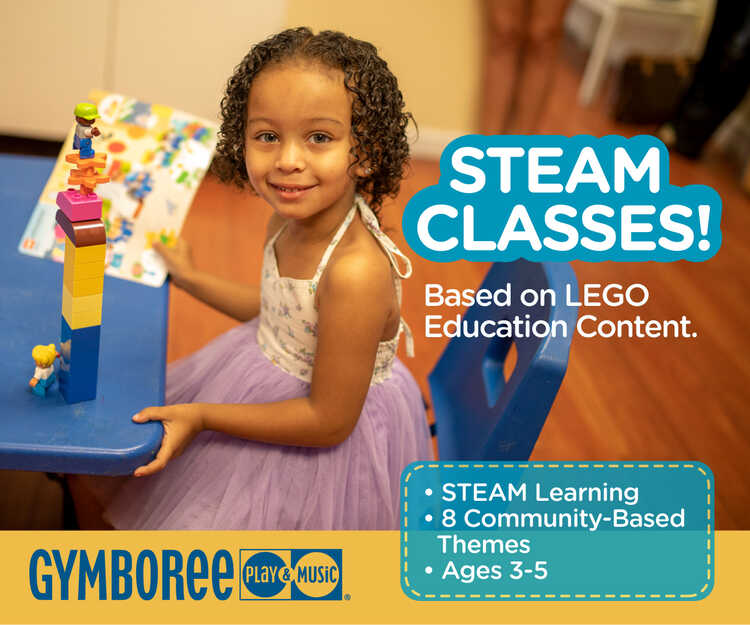STEM Programs Near Me

Summer Camp - Let's Get Chemical
100%
by The Citizen Science Lab
Pittsburgh, PA
Explore, Experiment & Unleash Your Inner Scientist Step into the exciting world of chemistry! This camp gives young scientists the chance to investigate the building blocks of matter through colorful reactions, hands-on experiments, and playful discovery. Throughout the week campers explore how atoms connect and how materials behave. From bubbling mixtures to crystal creations to stretchy polymers, this camp lets kids experience the wonder of chemistry up close. Whether they dream of becoming a chemist, love experimenting, or simply enjoy figuring out how things work, campers will build confidence as they explore real scientific concepts in a fun and engaging environment. All Summer Campers receive a free TCSL t-shirt!
In-person
Ages 7-11 years

Summer Camp - Junior Detectives!
100%
by The Citizen Science Lab
Pittsburgh, PA
Investigate, Analyze & Solve the Science Behind Crime Step into the world of forensic science! Junior Detectives gives teens hands-on experience with DNA, fingerprints, microbiology, blood analysis, and the investigative tools used to uncover clues and piece together a case. Throughout the week, campers explore real scientific techniques and apply them to mystery-solving challenges that bring the world of crime investigation to life. Whether they dream of working in a lab, solving crimes, studying biology, or simply enjoy unraveling complex puzzles, campers will gain confidence using scientific methods grounded in real-world investigative work. All Summer Campers receive a free TCSL t-shirt!
In-person
Ages 7-11 years

Unicorn Dream Squad – The Return (4.5 - 8 years old )
100%
by Messy Art Lab
San Francisco, CA
A brand-new week for returning Dream Squad artists (and new ones too)! Campers will take unicorn-inspired art even further with new materials, bigger ideas, and plenty of sparkle. Every project is magical in its own way. Messy Art Lab Summer Camp Info 🌈 Art Show Each week ends with a special Art Show, where campers proudly share their amazing creations with family and friends! It’s a joyful celebration of their creativity and the wonderful work they’ve done all week. 🕘 Schedule Drop-off: begins at 9:00 AM Pick-up: 2:45–3:00 PM Aftercare: available 3:00–5:00 PM Aftercare Details: Aftercare can be purchased as a weekly package. We do not offer aftercare on Fridays. If you’d like to book individual aftercare days, please email Betty@messyartlab.com for availability. 🧺 What to Bring Please help your child come prepared for a fun (and messy!) creative day. 🚫 No nuts or nut products of any kind, please. -Two healthy snacks (morning & afternoon) -Lunch (no candy, gum, or sugary drinks) -A refillable water bottle -Comfortable, paint-friendly clothes -A jacket, sunhat, and layers for outdoor play -Sunscreen applied before camp -A full change of clothes (just in case!) 🧒 Camper Requirements To keep our camps safe, fun, and creative for everyone: -Campers must be 4 years and 6 months old by the first day of camp. (We’re not able to make exceptions to this policy.) -Campers should be able to follow safety instructions and engage in activities for about 30 minutes at a time. -Campers must be fully potty-trained and able to use the bathroom independently. -Please share any medical, behavioral, or developmental information (such as allergies, neurodiversity, or trauma) during registration. This helps us prepare thoughtfully and ensure a positive, supportive experience for every child. (All information is kept confidential.) 💰 Refunds & Cancellations We know plans can change! Please review our camp refund policy below: 100% refund for cancellations made within 24 hours of registration. All enrollments include a non-refundable 20% deposit. Cancellations made 30+ days before the camp start date: refund minus the 20% deposit. Cancellations made within 30 days of the camp start date: No refund unless we can fill your spot, in which case you’ll receive camp credit minus the 20% deposit. All cancellation requests must be sent in writing via email. Transfers to another camp week may be requested (based on availability). A 20% fee applies for transfers requested within 30 days of the original camp week.
In-person
Ages 4-8 years

Play Space Daily Pass
99%
by STEMful-San Francisco
San Francisco, CA
STEMful is a space designed for parents to play with their children. We have a wide selection of toys and structures for children up to 8 years old. Use this daily pass to purchase/register a play space pass for your children. - To register children 0 up to 5 months, enter PlaySpace0 during check out old to pay $0/play pass. - To register children 6 up to 11 months, enter in PlaySpace50 during check to pay $7/play pass. Play Space package can be applied to a daily pass purchase. Children's name and birthday must be on registration account. Note: Saturday PlaySpace will be cancelled if a private party is booked. If you booked a date in advance we will refund you.
In-person
Up to 8 years

Spring C 2026: Everything Art Classes (Elementary K-5) Tuesday
99%
by All Things Art Studio
St. Charles, IL
This combination class offers children a sampling of art projects using various media such as painting, clay, watercolors, collage, and pastels. It is amazing what you can create when you explore with your imagination. A variety of materials are used to create your many masterpieces – Many projects are “built upon” each class, so that students experience a variety of mediums and take home several projects. Projects are new every session & seasonal, so sign-up for all sessions.
In-person
Ages 5-13 years
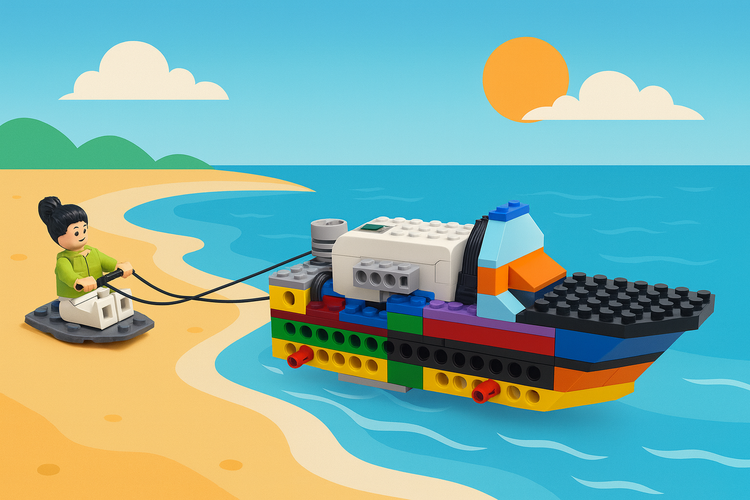
IntelliBricks Lego® Robo Space & Motion Lab
100%
by IntelliBricks
Roseville, CA
Spin. Soar. Engineer. In this high-energy LEGO® Robotics theme, students explore machines that spin, soar, splash, and perform dramatic actions—all while learning to code and control their creations. Each build uses rare and hard-to-find LEGO® elements to create dynamic motion and expression. Students will program motors and sensors using a beginner-friendly drag-and-drop interface, building both engineering and creative skills in every session. Disclaimer: Students will not take home any LEGO® kits, parts, or creations. This program is not affiliated with, endorsed by, or sponsored by the LEGO Group.
In-person
Ages 6-10 years

Spring B 2026: Everything Art Classes (Elementary K-5) Tuesday
99%
by All Things Art Studio
St. Charles, IL
This combination class offers children a sampling of art projects using various media such as painting, clay, watercolors, collage, and pastels. It is amazing what you can create when you explore with your imagination. A variety of materials are used to create your many masterpieces – Many projects are “built upon” each class, so that students experience a variety of mediums and take home several projects. Projects are new every session & seasonal, so sign-up for all sessions.
In-person
Ages 5-13 years

IntelliBricks Lego® Robotics Space & Motion Lab
100%
by IntelliBricks
Folsom, CA
Spin. Soar. Engineer. In this high-energy LEGO® Robotics theme, students explore machines that spin, soar, splash, and perform dramatic actions—all while learning to code and control their creations. Each build uses rare and hard-to-find LEGO® elements to create dynamic motion and expression. Students will program motors and sensors using a beginner-friendly drag-and-drop interface, building both engineering and creative skills in every session. Disclaimer: Students will not take home any LEGO® kits, parts, or creations. This program is not affiliated with, endorsed by, or sponsored by the LEGO Group.
In-person
Ages 6-12 years

Microbial Mondays
100%
by The Citizen Science Lab
Pittsburgh, PA
In this program, young scientists will dive into the world of microbiology, learning techniques for working with bacteria, DNA, and more. They’ll gain hands-on experience with cutting-edge tools and methods to unlock the secrets of the microscopic world. Join us to explore, experiment, and ignite your passion for science!
In-person
Ages 10-18 years
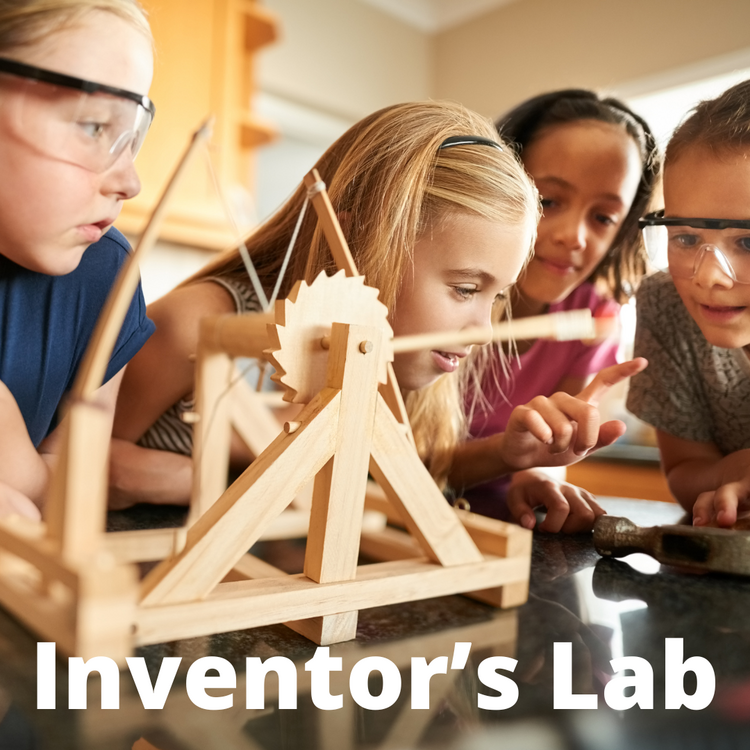
Inventor’s Lab + All-Sports Camp
100%
by GrowFit | Berkeley
Berkeley, CA
⚙️💡 Ignite Creativity at GrowFit’s Inventor’s Lab + All-Sports Camp! Does your child love building things, taking them apart, and imagining what’s possible? GrowFit’s Inventor’s Lab + All-Sports Camp invites young creators in grades 1–3 to dream big, test bold ideas, and bring their inventions to life—then burn off energy with an afternoon of action-packed sports! This is where imagination meets movement, and every child becomes a problem-solver, builder, and innovator. Why Choose GrowFit’s Inventor’s Lab + All-Sports Camp? 🛠️ Hands-On Building Adventures: Campers use simple materials—cardboard, tape, recycled parts, craft sticks, rubber bands, and more—to design and build their own inventions. Think launchers, bridges, contraptions, machines, and imaginative creations that surprise even them! 💡 Creative Engineering: Through guided challenges, kids explore engineering, design thinking, and “What happens if…?” experimentation in a playful, age-appropriate way. 🧠 Invent, Test, Improve: Campers sketch ideas, build prototypes, test them out, and refine their creations—just like real inventors. It’s all about growth, curiosity, and celebrating the “aha!” moments. 🏅 Active, High-Energy Afternoons: After lunch, campers join our All-Sports Camp for a daily mix of games like soccer, basketball, gaga ball, bounce house tag, and more. It’s the perfect blend of brains and play! 🤝 Teamwork & Problem-Solving: Whether building a tower with teammates or working together on a group invention, campers collaborate, communicate, and cheer each other on. 📈 Full-Week Experience: Each day builds on the last, allowing young inventors to brainstorm, create, and improve throughout the week. Full-week registration is required. Camp Details 🕘 Time: 9:00 AM – 4:00 PM (Full-Day Program) 🛠️ Morning: Inventor’s Lab (9:00 AM – 12:00 PM) 🏅 Afternoon: All-Sports Camp (12:00 PM – 4:00 PM) 📍 Location: The Academy 🚗 Drop-off: 8:45–9:00 AM 🚗 Pick-up: 3:30–4:00 PM 🎒 What to Bring: Comfortable clothes for building, water bottle, lunch, and two snacks. With over a decade of creating unforgettable experiences, GrowFit’s Inventor’s Lab + All-Sports Camp inspires creativity, confidence, resilience, and joy—where ideas take shape and kids discover what they’re capable of! ⚙️ Ready to Invent, Build, and Play? Spaces fill fast—register today and watch your child’s imagination soar! Refunds and Cancellations: 30+ days before camp: full refund minus 10% fee Within 30 days: credit for future GrowFit camps On or after the start date: non-refundable Tax ID: 81-1018163
In-person
Ages 6-9 years
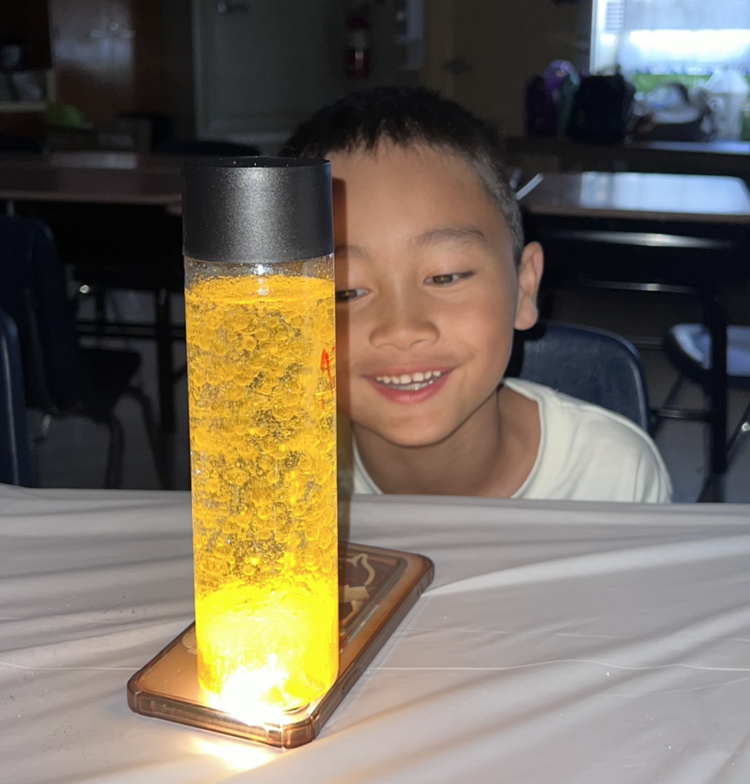
Science + All-Sports Camp
100%
by GrowFit | Berkeley
Berkeley, CA
⚡🔬 Spark Curiosity and Movement at GrowFit’s Science + All-Sports Camp! Calling all future scientists, inventors, and explorers in grades 1–3! GrowFit’s Science + All-Sports Camp blends the excitement of hands-on discovery with the energy of multi-sport fun. Mornings are all about science experiments, creativity, and discovery—while afternoons are packed with sports, teamwork, and laughter. It’s the perfect balance of brain power and playtime! Why Choose GrowFit’s Science + All-Sports Camp? 🔬 Explosive Science Fun: From building erupting volcanoes and creating glow-in-the-dark bouncy balls to crafting colorful kaleidoscopes, campers explore the magic of science through exciting hands-on experiments. 🧪 Curious Minds at Work: Campers dive into chemistry, physics, and engineering concepts in a playful, age-appropriate way that sparks critical thinking and creativity. 🏅 Active Afternoons: After lunch, the fun continues with our All-Sports Camp—featuring a variety of games like soccer, basketball, gaga ball, and bounce house tag. 🤝 Teamwork and Discovery: Whether mixing experiments or mastering teamwork on the field, campers collaborate, problem-solve, and celebrate each other’s successes. 📈 Full-Week Experience: Each day builds on the last, so full-week registration is required—giving kids the time to fully explore, experiment, and grow. Camp Details: 🕘 Time: 9:00 AM – 4:00 PM (Full-Day Program) 🔬 Morning: Science Camp (9:00 AM – 12:00 PM) 🏅 Afternoon: All-Sports Camp (12:00 PM – 4:00 PM) 📍 Location: The Academy 🚗 Drop-off: 8:45–9:00 AM | Pick-up: 3:30–4:00 PM 🎒 What to Bring: Comfortable clothes that can get messy, a water bottle, lunch, and two snacks. With over a decade of experience delivering enriching and fun-filled camps, GrowFit’s Science + All-Sports Camp inspires curiosity, confidence, and connection—where discovery meets play every single day! ⚡ Ready to Experiment, Explore, and Play? Spots fill quickly—register today and watch your child’s curiosity and creativity come to life! Refunds and Cancellations: Cancellations made at least 30 days prior to the camp date will be eligible for a full refund, minus a 10% cancellation fee. For cancellations within 30 days of the camp start date, we’re happy to offer a credit for future participation. Please note: cancellations on or after the start of camp are non-refundable. Tax ID: 81-1018163
In-person
Ages 6-9 years

Summer Camp
100%
by NoVA Playlabs
Fairfax, VA
Enjoy a well-rounded summer at NoVA PlayLabs and avoid the summer brain drain. Our Summer Camps offer a good mix of fun and academics, learning and chill time, and quiet activities and active play. We will spend time outside playing and eating snacks and lunch. Students will be grouped by grade level and rotate among different stations. We maintain a small 1:8 instructor/student ratio in order to give personalized attention to each student. For ages 5-14. Please pack two snacks, a lunch, and a water bottle (water refilling station is available). NO phones or tablets are allowed. Parents may call or text at any time (571-250-7719) to ask about their kids. 🤧 Our make-up policy for illness is very generous in order to encourage sick students to stay home 💲Fees are non refundable, but can be used towards another week, based on availability. 👶👶 Early Registration discount does not apply to the sibling discount. Final fee for the sibling is $325 and the discount will be refunded to you.
In-person
Ages 5-14 years
sibling discount

Pollinator Protectors - Curie/DaVinci/Tesla
99%
by STEMful-San Francisco
San Francisco, CA
Bees, butterflies, and moths, oh my! Ever wonder about the tiny but crucial role pollinators play? Become a Pollinator Protector! In this camp, students put on their explorer wings to learn about these small but mighty creatures and their vital contribution to biodiversity, ecosystem stability, and even our food security. We'll investigate the challenges pollinators face and discover ways we can help protect them. Find out why we need pollinators, and why they definitely need us!
In-person
Ages 4-9 years

Summer Camp
100%
by NoVA Playlabs
Fairfax, VA
Enjoy a well-rounded summer at NoVA PlayLabs and avoid the summer brain drain. Our Summer Camps offer a good mix of fun and academics, learning and chill time, and quiet activities and active play. We will spend time outside playing and eating snacks and lunch. Students will be grouped by grade level and rotate among different stations. We maintain a small 1:8 instructor/student ratio in order to give personalized attention to each student. For ages 5-14. Please pack two snacks, a lunch, and a water bottle (water refilling station is available). NO phones or tablets are allowed. Parents may call or text at any time (571-250-7719) to ask about their kids. 🤧 Our make-up policy for illness is very generous in order to encourage sick students to stay home 💲Fees are non refundable, but can be used towards another week, based on availability. 👶👶 Early Registration discount does not apply to the sibling discount. Final fee for the sibling is $325 and the discount will be refunded to you.
In-person
Ages 5-14 years

Play Lab
99%
by Gymboree Play & Music, Fullerton
Fullerton, CA
A multi-disciplinary class designed to introduce your child to engineering, design, art and math. This S.T.E.A.M. inspired class is great for the young maker and thinker. It takes an active approach to school readiness and maintains our whole-child learning philosophy.
In-person
Ages 2-5 years
sibling discount
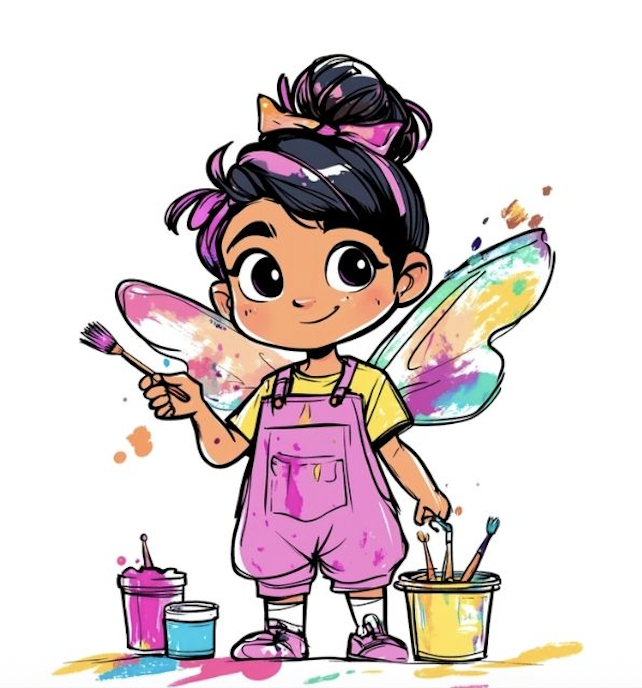
Morning Play Lab (1-3.5 Years Old)
100%
by Messy Art Lab
San Francisco, CA
Join us for a joyful morning of creativity, sensory exploration, and hands-on fun! Our Morning Play Lab is designed for little learners to explore at their own pace in a thoughtfully prepared environment filled with engaging materials and open-ended activities. During each session, children can freely rotate through our exploration stations, encouraging curiosity, independence, and imaginative play. Two optional guided activities will also be offered throughout the morning for those who’d like a little extra structure and creative inspiration. These instructor-led moments are gentle, process-focused, and tailored to support developmental growth without pressure or expectations. Perfect for toddlers and young children, this series offers a relaxed, welcoming space to create, discover, and connect—while caregivers enjoy watching their little ones learn through play. Series Details: ~Open exploration play stations ~Two guided activity opportunities per session ~Sensory-rich, child-led experiences ~Warm, supportive environment Come play, create, and explore with us this season!
In-person
Ages 1-3 years
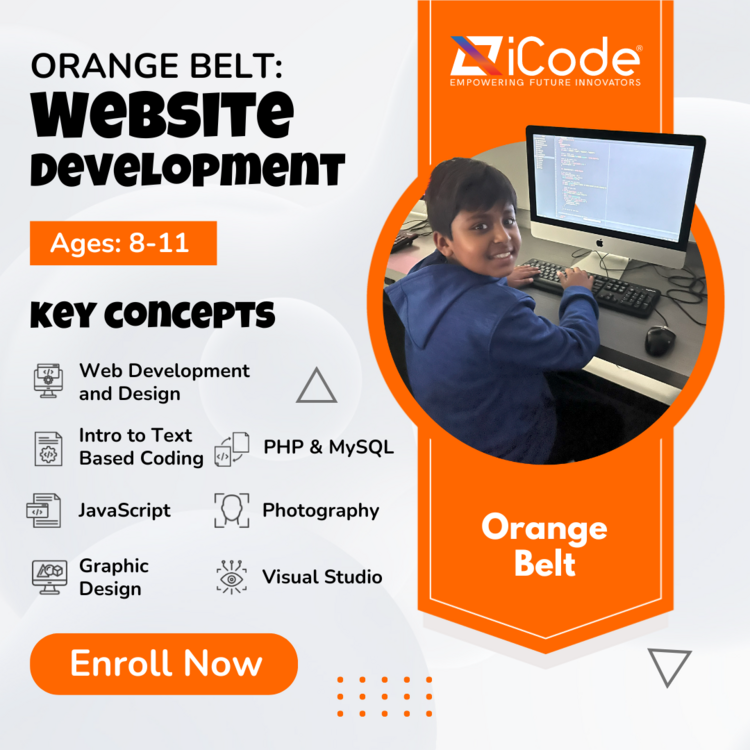
Orange Belt - iCode Redmond
by iCode Redmond
Redmond, WA
DESCRIPTION In this course, students learn the technical and artistic essentials of website development, from crafting web pages with HTML, CSS, and JavaScript to selecting hosting services and publishing online, while also learning to create high-quality website assets using professional photography techniques. KEY CONCEPTS HTML/CSS Programming Web Development and Design Introduction to Text-Based Coding Javascript Graphic Design Databases Photography Visual Studio SPRINTS Web Development Web Development II Photography JavaScript I Midterm Graphic Design Databases Web Hosting Final Project SOFT SKILLS Creativity Design Thinking Logical Thinking Writing Reports and Proposals OUTCOMES Development of a Dynamic Website Photography Portfolio
In-person
Ages 8-13 years

Sensory Art
100%
by NoVA Playlabs
Fairfax, VA
New policy to discourage no shows: a fee will be charged when you register and refunded to you when you attend class. We know that things come up, but a simple email, call or text (571-250-7719), even right before class starts, will get your fee back if you can't attend. We just don't want people holding a spot that could have gone to someone else who really wanted to attend. **************************************** We will show you simple ways to engage your child's five senses through materials commonly found around the house. Expect to spend at least an hour and a half for each Playgroup: -30 minute structured class where fine motor skills are practiced -Playtime to encourage social interaction -Snacks/Lunch eaten together as a class (please bring your own food)
In-person
8 months - 6 years

Play Lab
99%
by Gymboree Play & Music, San Diego
San Diego, CA
A multi-disciplinary class designed to introduce your child to engineering, design, art, and math. This S.T.E.A.M. inspired class is great for the young maker and thinker. It takes an active approach to school readiness and maintains our whole-child learning philosophy.
In-person
Ages 2-5 years

School Skills
100%
by Gymboree Play & Music, Nanuet
Nanuet, NY
This 2 hr. drop off class encourages curiosity and build self-confidence in your preschooler through art, science exploration, play and more. Teachers also read children's books that explore and nurture key social and emotional skills, engage in activities that require cooperation.
In-person
Ages 3-5 years
Showing 274 - 294 of 937







